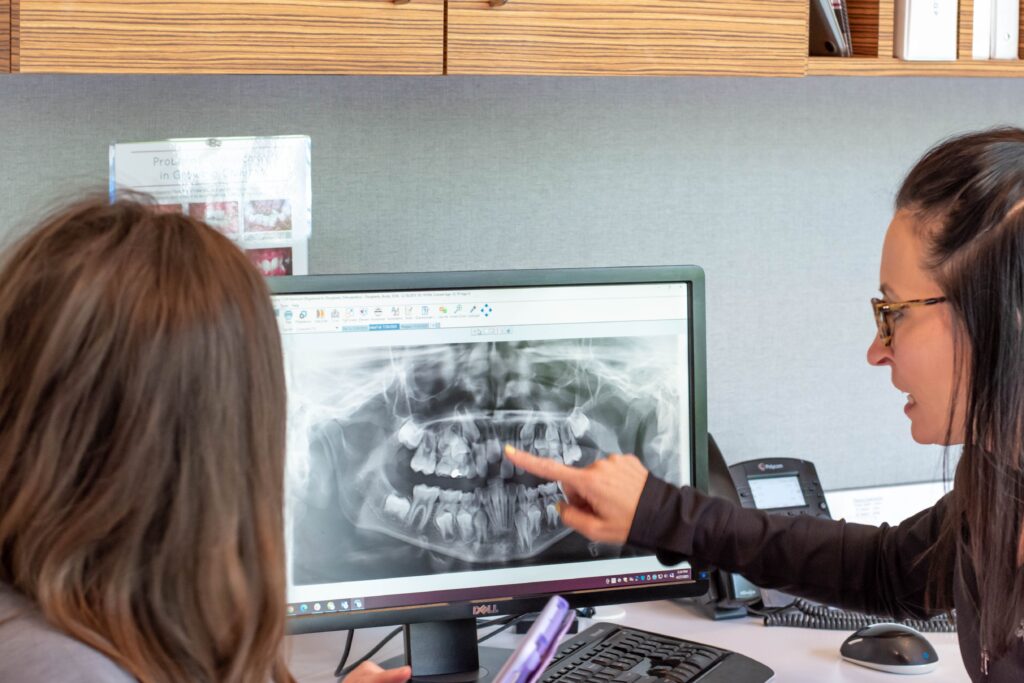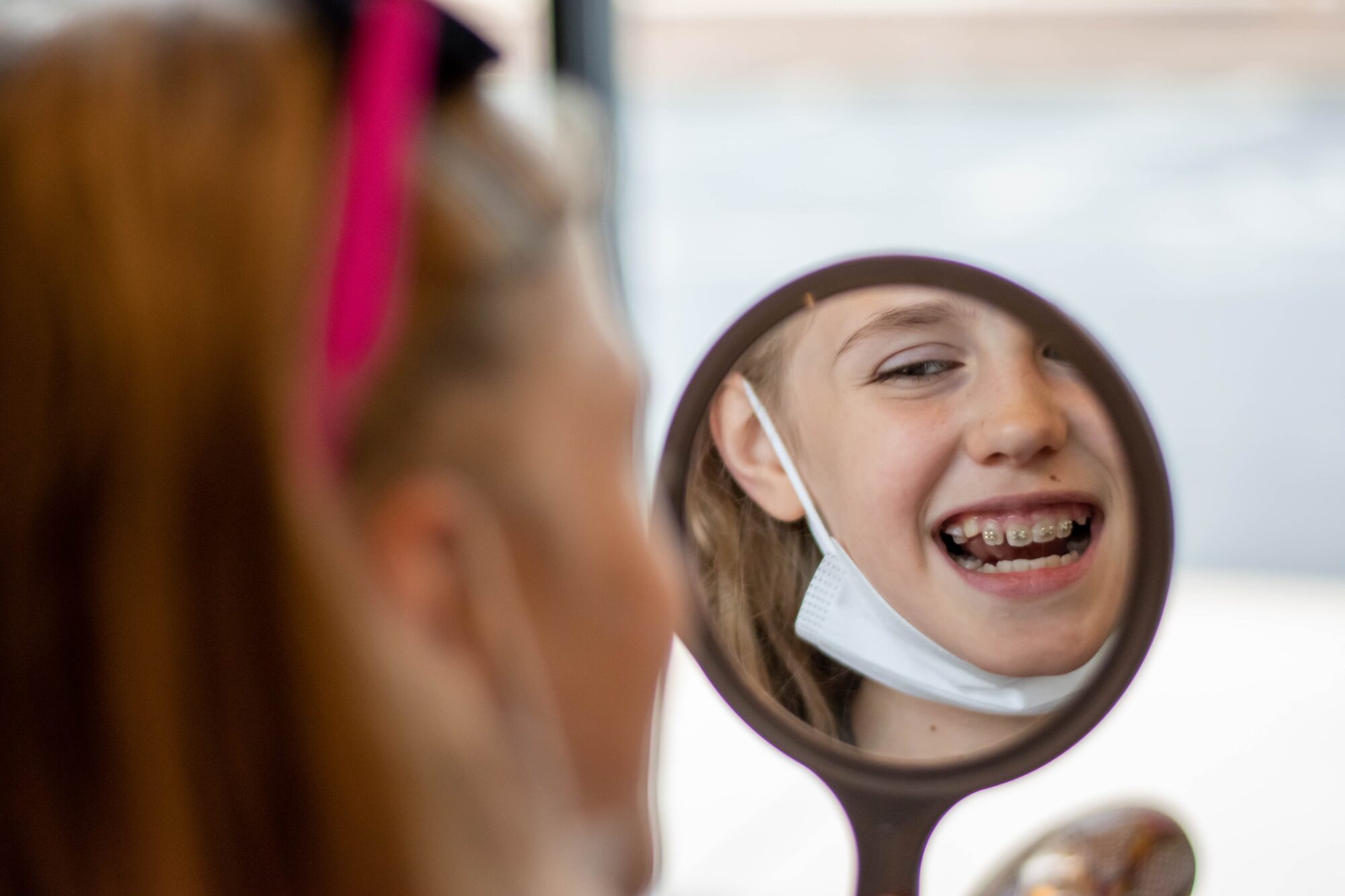Getting a great smile is about more than just looking good. Bite problems can cause serious health issues, like trouble eating and gum disease. At Dougherty Orthodontics, we’re here to help you fix any bite problems you might have. We’ll explain how to find the best way to fix your bite problems, the types of bite problems, and what causes them.
Solutions for a Better Bite
At Dougherty Orthodontics, we provide a range of treatments to solve your bite problems. The choice of orthodontic treatment depends on the type and severity of your malocclusion or bite problem, as well as your personal needs.
Fixing Bites With Clear Aligners
Clear aligners offer an easier alternative to braces. They’re custom-made, clear plastic trays that fit snugly over your teeth, applying pressure to gradually shift them into alignment. Aligners are also removable to let you eat and brush more easily than compared to braces.
Clear aligners are best suited for mild to moderate malocclusions and for older patients due to the need for more responsibility with them. You must wear them for up to 22 hours a day to be effective.
Strong Solutions With Metal Braces
Our most common orthodontic treatment, metal braces, are the most effective and durable option to fix your bite problem. They’re able to handle the most complex cases and can make serious tooth or jaw alignments.
Metal braces have brackets that attach to the front of your teeth and act as an anchor for the archwire. The archwire is the guide for your teeth, working with the brackets to gradually shift your teeth. We will adjust and tighten the archwire during your scheduled visits with us to keep your treatment on track.
See The Change With Clear Braces
Clear braces function the same as metal braces, but instead of metal brackets, they’ll use clear or tooth-colored brackets, which makes them less noticeable. Clear braces are more popular among teens and adults who are looking for a more aesthetic alternative to metal braces.
While clear braces can treat various bite problems, they’re more fragile than metal braces. This makes them not suitable for the most severe cases due to their weaker material than metal braces.
At Dougherty Orthodontics, we’ll evaluate your malocclusion and your needs and goals to decide which treatment will be best for you. Our goal will always be to bring out your best smile.

Navigating Your Bite Issues
Your smile can experience all types of teeth and jaw problems that’ll impact your oral health and bite function. These bite problems, called malocclusions, are most times misalignments.
Misalignments are where the upper and lower teeth don’t fit together correctly.
Malocclusions vary widely between people, and both environmental factors and genetic factors cause them. Let’s look at different types of bite problems:
Overcrowding vs. Spacing
These two are opposites of one another, but they can still cause bite problems. Overcrowding happens when there is not enough space in your jaw for all the teeth to fit normally. Teeth can become twisted, displaced, or overlapped. These teeth are hard to clean and will lead to tooth decay and gum disease.
Spacing is when there’s too much room in the jaw and there’s gaps between your teeth. While not as impactful as other malocclusions, they can be an aesthetic problem and can even trap food particles, causing oral health problems.
Underbite vs. Overbite
These are some of the most common types of bite issues. An overbite is when the upper teeth come out further than the lower front teeth, and an underbite is when the lower teeth extend out past the upper front teeth.
While overbites are the more common of the two, both can cause serious problems with your smile. From gum damage to difficulty in chewing and speaking, overbites and underbites are no small problem.
Crossbite Complications
This occurs when some upper teeth sit inside the lower teeth with the mouth closed. A crossbite can be on one or both sides of the mouth and affect the front teeth, the back teeth, or both at the same time!
It can also cause misalignment of your jaw, leading to uneven wear of your teeth, gum disease, and even bone loss.
The impact of bite problems can affect you simply beyond looks. They can cause problems in eating food, speaking to others, and keeping your teeth healthy. We’re very familiar with these problems at Dougherty Orthodontics and make it our goal to catch these types of problems early. Early detection and treatment means we can start your journey fast before more problems pop up.

The Root Causes of Bite Problems
Bite problems aren’t just for the unlucky few. There are two main factors that’ll cause issues with your bite. These are genetic factors and environmental factors.
Environmental: The habits you have growing up and the choices you make in your daily life can also lead to bite problems.
Some of your old habits, such as thumb sucking, using a pacifier for a long time, and bottle feeding past the recommended age, can place pressure on the teeth and jaw, leading to problems in your bite. Pressing the tongue against the teeth when swallowing or speaking can also create malocclusions.
Poor nutrition and injuries on your face or jaw can lead to bite problems. Lacking essential nutrients can lead to late tooth growth, underdeveloped jaws, and an increased risk of oral disease. Injuries from damage can disrupt tooth and jaw alignment, causing bite problems.
Genetics: Genetics influence on what kind of malocclusion you might have is significant. It’ll play a key role in deciding the size of your jaw, the space available for your teeth, and even when you gain and lose a tooth. You can trace bite problems such as overbites or overcrowding back to your family, which helps in determining the best treatment for your smile.

Making Bright Smiles at Dougherty Orthodontics
At Dougherty Orthodontics, we know how important a healthy and straight smile is. Our team is here to help you in St. Louis, from start to finish, to fix your bite. If you’re dealing with bite problems, don’t wait any longer. Contact us either by phone or by scheduling your free consultation today!
